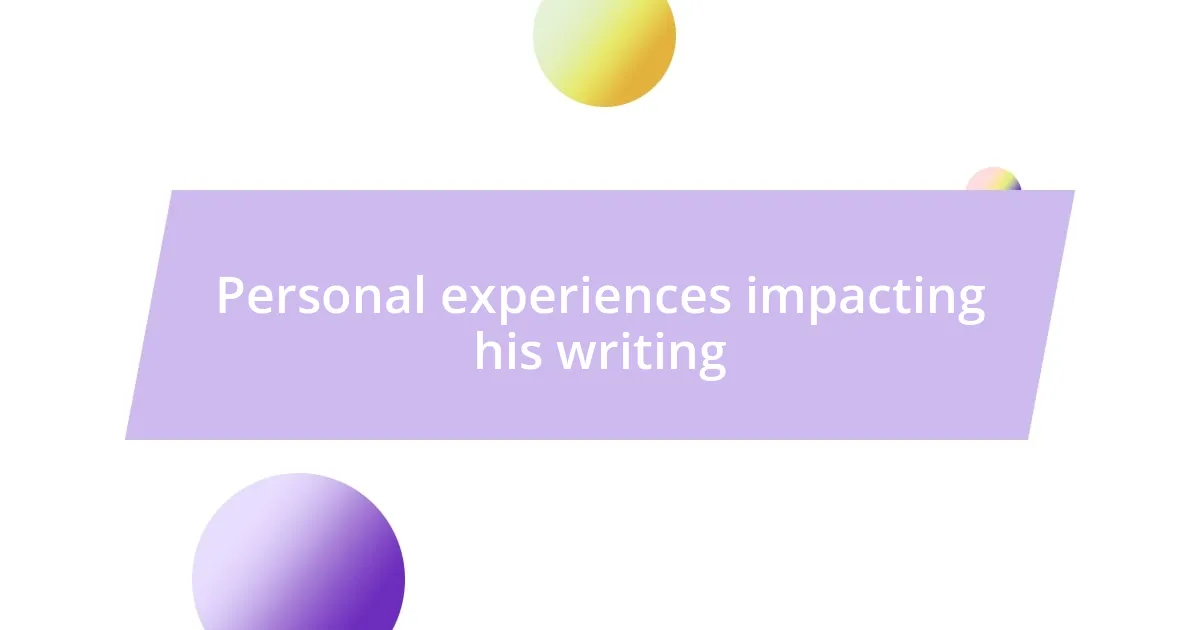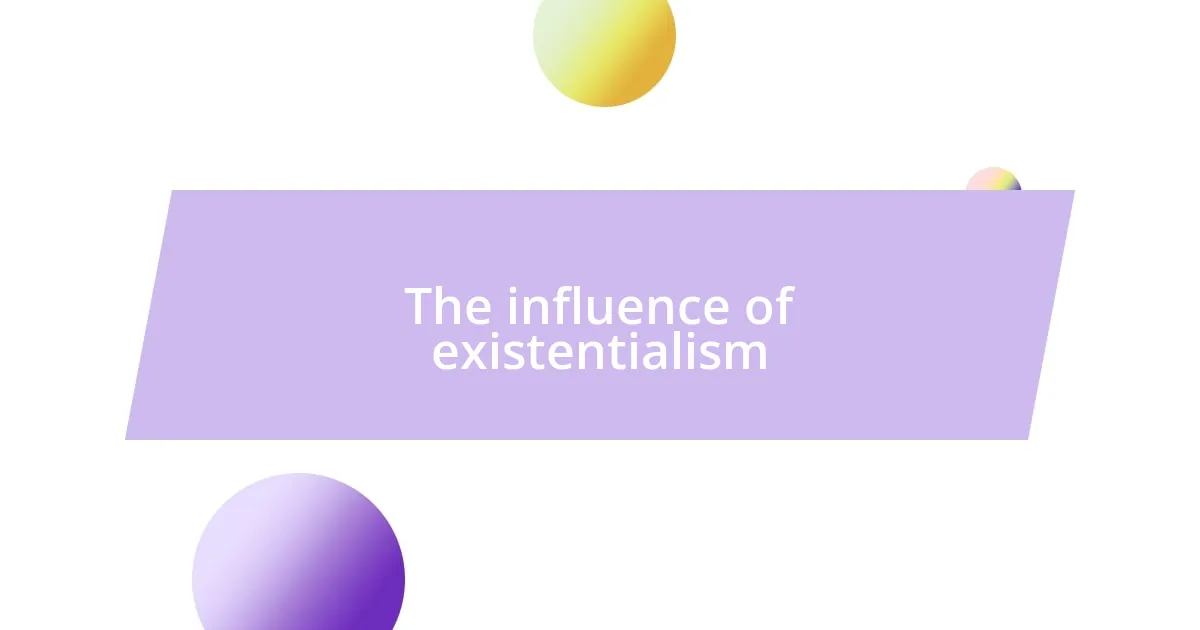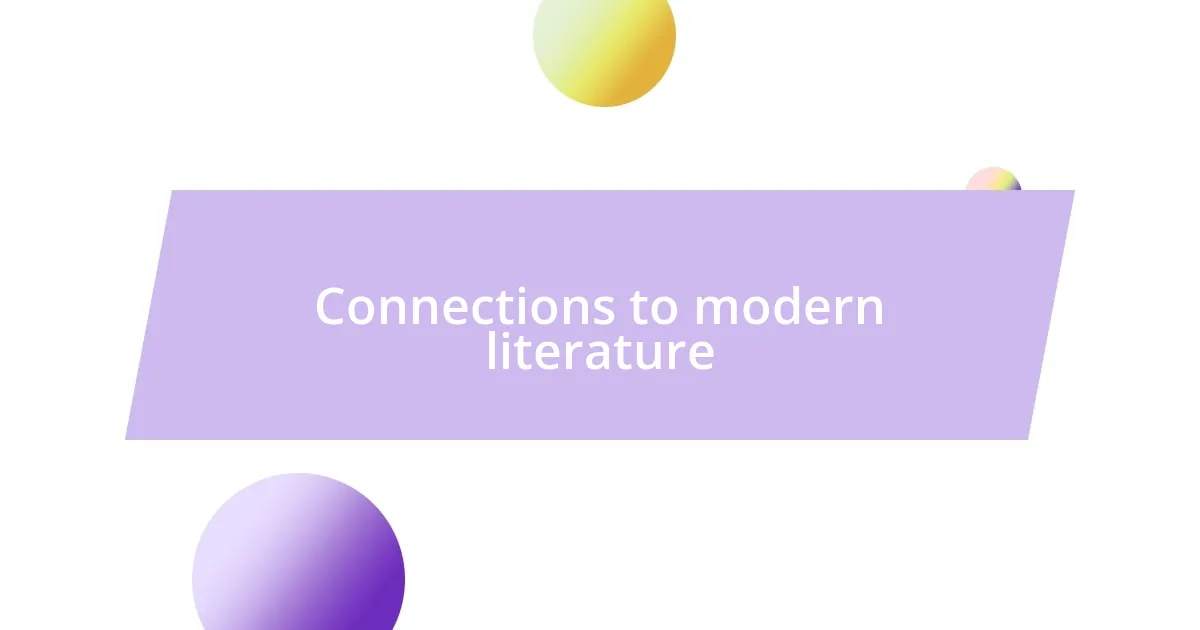Key takeaways:
- Kafka’s writing explores themes of alienation, existential dread, and the absurdity of life, resonating with readers’ personal experiences.
- His narratives reflect profound human emotions, inviting introspection about identity, societal pressures, and the nature of existence.
- Kafka’s influence is evident in modern literature, where contemporary authors echo his themes of surrealism and bureaucratic struggles.
- Applying Kafka’s insights encourages readers to embrace vulnerability and humor in navigating life’s complexities and absurdities.

Exploring Kafka’s unique style
Kafka’s writing style is often characterized by its surreal and absurd qualities, which create a dreamlike atmosphere. I remember the first time I read “The Metamorphosis,” where the striking image of Gregor Samsa transforming into a giant insect left me both horrified and fascinated. How could something so bizarre resonate so deeply with our human experience?
One of the most gripping aspects of Kafka’s prose is his ability to delve into themes of alienation and existential dread. I can still recall the unsettling feeling I had while reading “The Trial.” The protagonist, Joseph K., is ensnared in a bureaucratic nightmare that feels all too real. It made me reflect: do we not all feel like we’re pawns in a system that we don’t fully understand?
What truly stands out to me is Kafka’s unique blend of clarity and convolution. His sentences are often straightforward, yet the ideas within them can be profoundly complex. There’s something strangely comforting in that contradiction, don’t you think? It invites readers to embrace their own confusion while navigating life’s disorienting moments, much like Kafka himself.

Key themes in Kafka’s works
The recurring themes in Kafka’s works leave a lasting impression on anyone who delves into his literature. I vividly recall feeling an eerie sense of familiarity when encountering the pervasive element of isolation. It struck me how characters like Gregor Samsa grapple with their own alienation, mirroring my own feelings during moments of personal disconnection. This resonance between Kafka’s narrative world and my reality is what makes his writing so inspiring.
Key themes in Kafka’s works include:
- Alienation: Characters often feel estranged from society, reflecting a profound sense of loneliness.
- Existential Dread: A constant undercurrent questions the meaning of existence, evoking feelings of anxiety and confusion.
- Bureaucratic Nightmare: The absurdity of bureaucratic processes portrays a loss of control in an uncaring system.
- Transformation and Identity: Physical and psychological transformations challenge notions of self and reality, as seen in “The Metamorphosis.”
- Absurdity of Life: Kafka’s narratives often embrace the irrational, leaving readers to grapple with life’s complexities.
Each time I revisit Kafka’s work, I feel a deep connection to these themes, as they reflect shared human experiences and uncertainties. There’s a discomfort in that shared struggle, yet it’s also oddly comforting to know I’m not alone in questioning the fabric of reality.

Personal experiences impacting his writing
Kafka’s writing is deeply influenced by his personal experiences, which manifest vividly in his themes. Growing up in a Jewish family in Prague, Kafka grappled with cultural and societal pressures that often isolated him from others. This sense of disconnection resonates in his stories, evoking my own feelings of being an outsider. I can recall moments in my life where I felt caught between different worlds, much like Gregor Samsa, whose transformation symbolizes internal and external alienation.
The uncertainty Kafka faced in his relationships and career is echoed in the nightmarish scenarios his characters endure. I remember when I was navigating the complexities of my own career choices, feeling overwhelmed by expectations. It made me realize how Kafka’s portrayal of characters like Joseph K. resonates with those agonizing moments of self-doubt and fear of failure. These themes of vulnerability and existential anxiety speak to the heart of our human journey.
Lastly, Kafka’s struggle with his artistic identity profoundly impacts the tone of his writing. He often dealt with self-doubt about his craft, leading to a unique exploration of transformation and identity. There were times when I questioned my own creative abilities, feeling as if I needed to “transform” to fit a particular mold. Kafka’s exploration of individual identity in such a raw, vulnerable manner reminds me that our struggles with self-perception are a universal theme, binding us together in our search for authenticity.
| Personal Experience | Kafka’s Influence |
|---|---|
| Isolation in Diverse Cultures | Characters reflect feelings of alienation. |
| Professional Uncertainty | Nightmarish situations depict anxiety and self-doubt. |
| Artistic Struggles | Complex identity portrayed through transformations. |

The influence of existentialism
Existentialism plays a significant role in Kafka’s writing, weaving a thread of anxiety and absurdity through his narratives. I often find myself wrestling with the same existential dilemmas his characters face. Take Gregor Samsa, for instance; his metamorphosis into a bug raises the question—what does it mean to truly exist? It’s as if Kafka invites us to confront our vulnerabilities, prodding at the very essence of our identities.
When I reflect on Kafka’s portrayal of a meaningless struggle against an indifferent universe, I can’t help but relate it to my own experiences of feeling lost in a bustling city. There were moments when I felt like one of Kafka’s nameless characters, caught in a web of obligations that dulled my sense of purpose. The constant questioning of life’s significance in his writing resonates deeply with my own pondering of what makes our existence worthwhile—an introspection that often leaves me unsettled yet more aware.
This exploration of existential dread in Kafka’s work reminds me of conversations I’ve had with friends late into the night, sharing fears about our futures. I remember a night spent discussing the absurdities of life, how easily it can feel like we’re wandering in darkness without a guide. Kafka embodies that sentiment perfectly; his characters grapple with the existential weight of choice, freedom, and ultimately, absurdity. It’s through these shared reflections that I find insight and comfort, connecting deeply with the human condition.

Connections to modern literature
Kafka’s influence on modern literature is undeniable, serving as a bridge between the existential worries of his time and those of contemporary writers. I often see echoes of his themes in the works of authors like Haruki Murakami, whose characters also navigate surreal, disorienting worlds. Have you ever read something that made you feel like you were peeling back layers of reality? That sensation is prevalent in both Kafka and Murakami, where the ordinary morphs into the bizarre, prompting us to question our own existence.
In my own reading journeys, I frequently encounter the Kafkaesque nuances in modern novels, where characters are trapped in oppressive systems, much like Gregor Samsa. I remember feeling a jolt of recognition while reading “The Brief Wondrous Life of Oscar Wao” by Junot Díaz. The protagonist’s struggle against societal expectations and the weight of family legacy felt like a direct line to Kafka’s portrayal of alienation. Isn’t it fascinating how these themes persist, causing us to reflect on our battles with identity and societal pressures?
Additionally, the sense of absurdism that Kafka penned so effectively permeates the pages of modern literature. I sometimes find myself chuckling nervously at situations in contemporary novels that echo Kafka’s absurdity, like in “The Sellout” by Paul Beatty. I remember laughing out loud at the absurdity of societal quirks that mirrored the bizarre world Kafka created, only to realize later how insightful those moments were. This blend of humor and discomfort compels us to engage with serious themes, reminding us how tightly woven our modern struggles are with Kafka’s existential queries.

Lessons from Kafka’s narratives
Kafka’s narratives teach us about the complexity of human emotions and the often-contradictory nature of our desires and fears. I remember a moment when I felt overwhelmed by my own aspirations, akin to the characters in his stories. It’s intriguing how Kafka explores despair and hope simultaneously; have you ever felt that push-and-pull within yourself? It’s in those moments of conflict where I realize how relatable his characters truly are.
Another lesson from Kafka is the inevitability of isolation in the human experience. There were times in my life, particularly during my college years, when I felt a deep sense of loneliness even amidst friends. Like Kafka’s protagonists, I grappled with the idea that others could be around yet still remain distant. This realization opened my eyes to the profound ways we often fail to connect, urging me to reach out and foster genuine relationships—something I strive to do more consciously now.
Lastly, Kafka’s relentless questioning of authority and societal norms resonates with my own rebellious spirit. I recall a time when I pushed back against conventional expectations in my workplace, feeling like a character in one of Kafka’s bureaucratic mazes. It made me ponder: what does it mean to challenge the status quo? Kafka’s work instills a sense of courage within me to confront the absurdities of life, pushing boundaries and sparking my desire for authenticity.

Applying Kafka’s insights today
Applying Kafka’s insights today allows us to navigate our complex reality with a new lens. For instance, I once found myself stuck in a tedious corporate job, feeling as if I were in a Kafkaesque nightmare, where the daily grind wore me down. Have you ever felt trapped in a situation that seemed absurd? This experience reminded me of Kafka’s characters, who push us to confront the surreal elements of our own lives.
Delving into Kafka’s relentless questioning of existence has shaped how I view my relationships. There was a period when I felt estranged from friends who seemed to be moving on without me. It made me reflect on Kafka’s exploration of alienation and connection, prompting me to examine the authenticity of my interactions. How often do we allow societal expectations to dictate our friendships? This insight encouraged me to embrace vulnerability, fostering deeper, more meaningful connections with those around me.
Kafka’s absurdism compels me to approach life’s absurdities with a sense of humor. I vividly recall attending a meeting that spiraled into chaos, where everyone’s ideas clashed like characters in “The Trial.” Instead of feeling frustrated, I laughed at the foolishness of it all, recognizing the shared human experience in moments of confusion. Can humor help us grapple with the absurdity of our lives? I believe it does, allowing us to maintain a level of perspective that Kafka himself might have appreciated.












